Insiders
Focus on US Default Crisis

Maldives Promotion House – Tourism Professionals all over the world have begun to discuss the depth of the impact from the fallout of the US “Default” crisis and the potential credit rating decline. Experts in Maldives have also expressed concerns about the ongoing and worldwide crisis that will touch people throughout the tourism and travel industry.
While it is critical that experts do not get tangled up in rumours or widely spreading headlines, the crisis has less to do with raising an artificial debt ceiling and more to do with simple debt. According to Dr. Peter E. Tarlow, the President of Tourism and More, Special to ETN, many Western nations, including the US, simply spend more money than they take in.
“Though most Western nations have practiced some form of this economic policy for decades. The unfortunate results of overspending have created highly unstable societies in countries such as Greece, Italy, Spain, Portugal, and Ireland. In all of these nations, deficit spending has been instituted as a means of paying for what is often called “The Social Net,” and there is the assumption that it is the government’s job to “Smooth” out a society’s business and economic bumps,” Dr. Tarlow said.
Dr. Tarlow further explains his view. While in the US, this social net has always existed, the government participation has been much less, while traditionally, Americans have tended to rely on volunteerism and community-service providers, such as religious institutions, rather than government bureaucracies. Thus the social net has existed but at far less governmental cost. Some economists believe that due to the less reliance on government to provide the social net, the US, at least until now, has been able to avoid the economic tragedies that are now occurring across much of Southern Europe.
Despite whatever happens in Washington, there are a number of other factors that will impact tourism. Among these are:
1. Even if the most extreme budget bill is passed, the US is still spending more than USD1,000,000,000,000 (one trillion) dollars more than it receives.
2. US economic national product is down to less than 1.4 percent. That means that economic growth is at about zero.
3. In the US, unemployment is now increasing and housing prices are continuing to be down.
4. China is now facing a major economic slowdown.
5. Germany is now feeling the first signs of a looming recession and may no longer be able to bail out Europe’s so-called PIIGS countries (Portugal, Italy, Ireland, Greece and Spain). While the euro will not disappear tomorrow, its longevity may now be in doubt.
Here are some of the ways that tourism and travel professionals can expect the current economic crisis to impact their industry and some ideas for economic survival in highly turbulent times.
In this global economy, be prepared for continual currency readjustments. For years, the US dollar acted as the one stable currency. This fact is no longer true and unstable currencies in an interconnected world means that tourism officials must be prepared for price fluctuations. The impact of such unstable pricing means not only will many tourism providers be unable to set market prices but also that business plans will need to be updated on a continual basis.
Tourism, especially leisure tourism, is a discretionary expense and, therefore, vulnerable to mood swings. If the public is fearful of not having enough money to pay for basic necessities, then for many people, there is a tendency to pull back. This pulling back does not mean that people will cease to travel. It does mean that they may seek less expensive options, and for shorter time periods. Those tourism businesses that are in or close to major population centres have a great many new opportunities, while those destinations that are dependent on long-haul travel and more lengthy stays may have some challenges to overcome.
Expect this period of economic turbulence to be here for quite some time. Despite what politicians may say, the bottom line is that no one has a plan that is politically acceptable. In today’s world, there are more voters than workers and that means that politicians are afraid to make decisions that may cost them an election.
Foreign, non-business travel should decline as the cost of travel combined with lower salaries will impact the way citizens from major industrialized nations spend their money. This decline in foreign travel will be especially hurtful to those parts of the world, such as the Caribbean that have long depended on foreign visitors and have a reputation for being expensive, offering poor customer service and tending toward being unsafe.
Here are some ideas to prepare for what may be a difficult economic year.
Develop creative bundling packages. For example, create packages that allow business travel to be combined with family vacations. Encourage hotels to include breakfasts, Internet services, and other amenities within the cost of a room.
Keep prices as low as possible. No one likes to cut their profit margin, but some profit is better than no profit at all. Let people know that you care and that your prices reflect your concern for the public’s well-being.
Provide the best customer service possible. When money is tight, our tolerance for bad experiences is even less. These are the times not to make customer service mistakes, and if a mistake is made, make sure to apologize and correct the mistake. In economically-challenging times, no one wants to hear excuses for customer service errors.
In the US, the weak dollar means that many foreigners will find the US a highly-affordable vacation option. US tourism professionals need to internationalize their product and their outlook so as to attract both European and Asian visitors.
Many Latin American nations, due to the low cost of labour and short food supply distances, can also become new tourism destinations. However, issues of poor customer service, violence, and crime waves against tourists often plague this part of the world.
Seek markets that are closer to home. Smaller communities and communities that offer short-term tourism (2 or 3 days) can see increases in their potential market if they can solve problems such as: what to do on rainy days, lack of night time activities, and how to entertain children during inclement weather such as snow storms.
Unfortunately, the travel and tourism industry cannot change the world’s economic policies, but travel and tourism can teach political leaders around the world several important lessons. Among these are: during economically-challenging times, talk less and do more.
Dr. Tarlow has explained that this is not the time simply to market what you have, but rather it is the time to launch new products and become innovative. Creativity and out-of-the box thinking are essential skills for such a challenging economy and the travel and tourism industry are not going to go away.
According to Maleeh Jamal, the Secretary General of Maldives Association for Travel Agents and Tour Operators (MATATO), the Default Crisis will have a worldwide impact. However he also suggests that the direct impact to Maldives would be minor.
“The US market of tourists that visit Maldives is relatively small. Because of that, Maldives will experience only a minor direct effect from the crisis. But Europe will be highly affected by this and thus will create a major effect on tourism in Maldives, because the majority of the tourists to Maldives come from Europe,” Maleeh said.
“China also dominates the tourism market in Maldives and is a major credit partner to the US. So to some extend China’s economy will suffer, leading to a negative effect on the Maldivian Tourism. Moreover, the current statistics show that the world economy may not improve within the next two years. So if Maldives is to sustain its tourism, we have to device a strategic plan to focus on the upper class or the rich and wealthy market as well,” he added.
No matter what the credit rating may be, no matter what the cost of money, people are still going to travel. However, for tourism and travel to prosper rather than merely survive, the industry is going to have to be much more creative, innovative, and service oriented. Tourism centres that can choose to not to provide good service, offer poor security, and lack of new product innovation will not survive. Those, however who choose to offer excellent service and continually reinvent their product in a safe and secure environment are bound to not only survive, but in the end, will prosper.
Action
Freediving with tiger sharks: Shark Expedition Fuvahmulah collaborates with marine biologist Andriana Fragola

Shark Expedition Fuvahmulah, renowned for its world-class scuba diving encounters, has announced an exciting expansion: the chance to freedive with tiger sharks in the Maldives’ southernmost atoll.
Fuvahmulah, often hailed as the “Tiger Shark Capital of the World,” is the only place on the planet where year-round encounters with tiger sharks are virtually guaranteed. With more than 280 identified resident tiger sharks, the island has become a bucket-list destination for divers and marine enthusiasts alike.
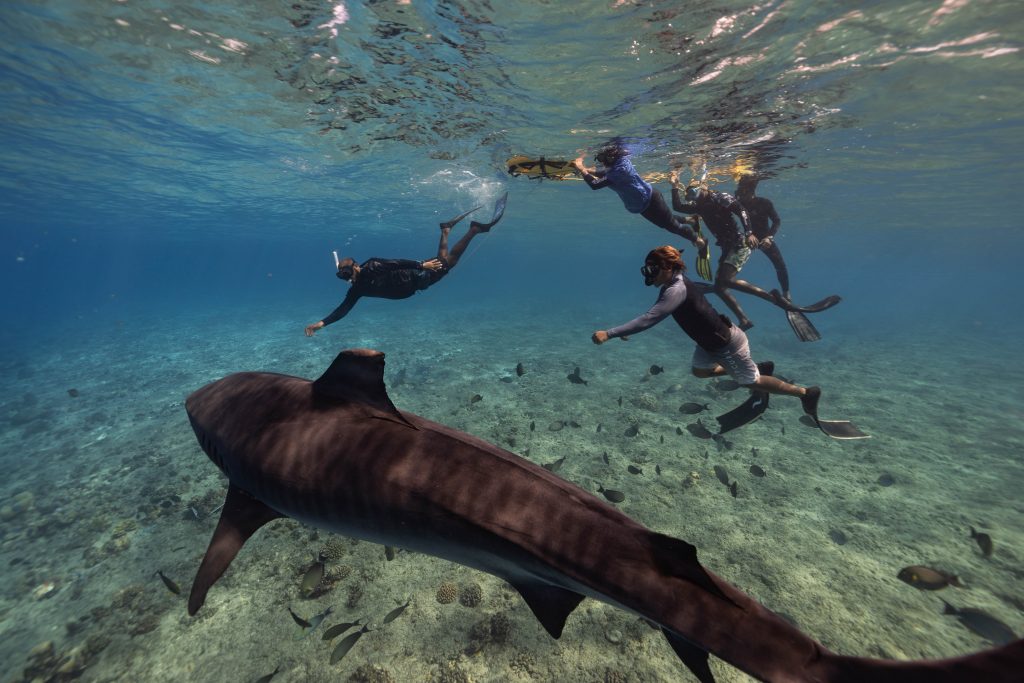
The newly introduced freediving experience offers a unique way to interact with these apex predators. Unlike scuba diving, freediving takes place without bubbles or heavy gear, allowing participants to connect with tiger sharks in a quieter, more natural way. This approach often makes the encounter more comfortable for the sharks and more intimate for the diver.
Guiding these expeditions is Andriana “Andy” Fragola, a marine biologist, shark diver, and conservationist currently based in Hawaii. Andy holds a Master’s Degree in Marine Conservation Biology with a focus on shark microbiology and has dedicated her career to shark research, conservation, and public education. Through her work in media and content creation, she strives to raise awareness about the importance of shark conservation and inspire people to take action to protect marine ecosystems.
“Freediving with tiger sharks is a raw and transformative experience,” says Andy. “Being eye-to-eye with these incredible animals without the barrier of scuba gear allows you to see them for what they truly are—powerful, intelligent, and essential to the health of our oceans.”
Shark Expedition Fuvahmulah ensures that all freediving activities are conducted under strict safety protocols. With experienced professionals like Andy leading the dives, participants can expect both an exhilarating and responsible adventure.
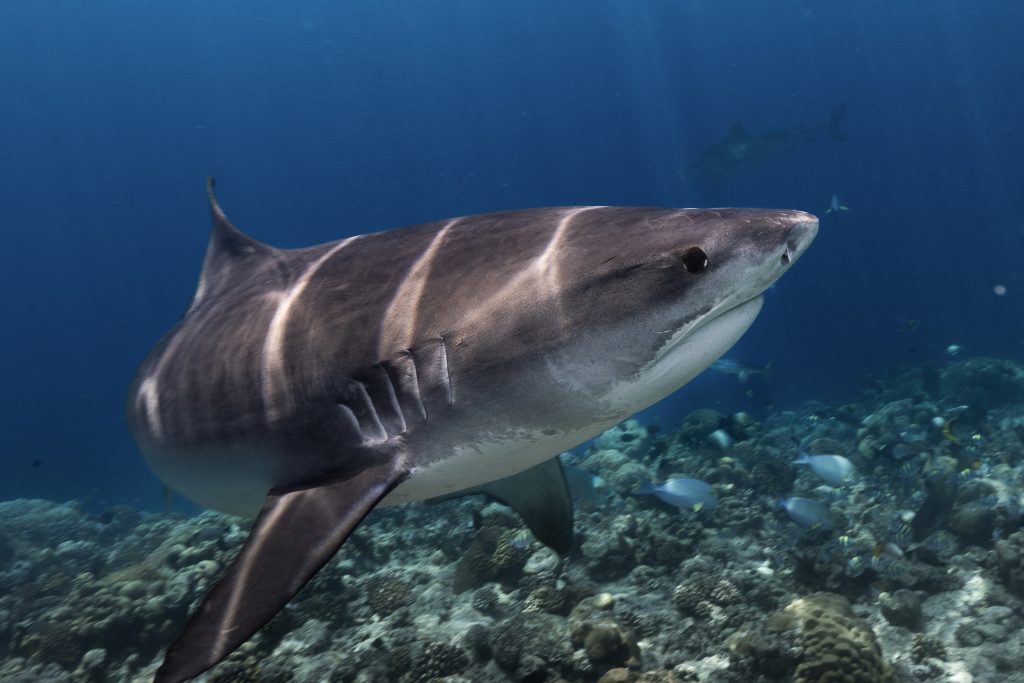
Why this experience stands out:
- Eye-to-eye encounters with tiger sharks in their natural habitat.
- A deeper, more personal connection with marine life.
- Expert-led guidance ensuring safety and conservation awareness.
In addition to freediving, Shark Expedition Fuvahmulah offers a range of packages, including accommodation options, making it easier for adventurers to fully immerse themselves in the island’s extraordinary marine environment.
For bookings and more information:
📧 Email: sales@scuba-expeditions.com
📱 WhatsApp: +960 9894653
🌐 www.scuba-expeditions.com
News
MIC appoints Ali Shakir as Group General Manager

Maldives Inflight Catering Pvt Ltd (MIC) has announced the appointment of Ali Shakir as the Group General Manager. With over 27 years of experience in the hospitality industry, Ali Shakir will now oversee operations for the Maldives Inflight Kitchen, Hulhule Island Hotel, and Madifushi Private Island Maldives.
Ali Shakir, who most recently served as General Manager at OBLU NATURE Helengeli by SENTIDO, played a pivotal role in the resort’s redevelopment and reopening. Prior to that, he joined Atmosphere Core in 2019 as Resort Manager at VARU By Atmosphere, where he was instrumental in the pre-opening of several properties, including OBLU XPERIENCE Ailafushi, OBLU SELECT Lobigili, OZEN RESERVE BOLIFUSHI, and VARU By Atmosphere. His wealth of experience also includes key positions at prestigious resorts such as Angsana Velavaru, Hulhule Island Hotel, and Paradise Island Resort and Spa.
Ali is no stranger to MIC, having spent more than 15 years at Hulhule Island Hotel, where he rose through the ranks to become Executive Assistant Manager before departing in 2019.
Commenting on his new role, Ali Shakir expressed his enthusiasm:
“I am honored to rejoin MIC and lead the operations of these iconic properties. This company has always held a special place in my career, and I am excited to work with the talented team to drive further success and innovation.”
Ibrahim Shareef Mohamed, Managing Director of MIC, welcomed Ali to the leadership team, praising his extensive experience and strategic vision:
“We are delighted to have Ali back at MIC. His proven track record in the hospitality sector, combined with his in-depth knowledge of Hulhule Island Hotel and his previous achievements, makes him the ideal leader to take us forward. I have no doubt that under his leadership, MIC will continue to set benchmarks for excellence.”
Ali Shakir holds a General Managers Program certificate from Cornell University, USA, and a General Hotel Service certification from the Institute of Hotel and Catering Service, Maldives.
MIC is a joint venture between Maldives Airports Company Limited and SATS Ltd, renowned for its inflight catering services to airlines and private jets. Beyond the Maldives Inflight Kitchen, MIC also manages Hulhule Island Hotel, the only airport hotel at Velana International Airport, and the luxurious Madifushi Private Island Maldives in Meemu Atoll.
Tips & Advice
Flying after scuba diving: Essential guidelines for safe travel

Scuba diving in the Maldives offers an unparalleled experience, with its vibrant coral reefs, diverse marine life, and crystal-clear waters. However, one crucial aspect that divers must consider is the timing of their flights after diving. Understanding the recommended waiting periods before flying is essential to ensure safety and prevent decompression sickness. Here’s what you need to know.
Understanding Decompression Sickness
Decompression sickness, also known as “the bends,” occurs when nitrogen bubbles form in the bloodstream and tissues due to rapid changes in pressure. This can happen if a diver ascends too quickly or flies too soon after diving. The reduced cabin pressure in an airplane can exacerbate the formation of these bubbles, leading to serious health risks.

Recommended Waiting Times
The waiting time before flying after scuba diving depends on the type and number of dives completed. Here are the general guidelines:
- Single Dive: If you have completed a single, no-decompression dive, it is recommended to wait at least 12 hours before flying. This allows sufficient time for the body to eliminate excess nitrogen.
- Multiple Dives or Multiple Days of Diving: For divers who have completed multiple dives or have been diving over several days, the recommended waiting period extends to 18 to 24 hours. This longer duration helps ensure that nitrogen levels in the body have decreased to safe levels.
- Dives Requiring Decompression Stops: If your dive profile included decompression stops, it is crucial to wait at least 24 to 48 hours before boarding a flight. Decompression dives involve higher nitrogen absorption, necessitating a longer off-gassing period.
Seaplane and Domestic Flights
Many tourists visiting resorts and other islands in the Maldives travel by seaplane or domestic flights. While these flights generally operate at lower altitudes compared to international flights, the same waiting time guidelines apply. The reason is that even at lower altitudes, the risk of decompression sickness remains significant due to the changes in pressure.
Practical Tips for Divers
- Plan Your Dives and Flights: When planning your diving trip, consider your flight schedule. Ensure that you have ample time between your last dive and your flight to adhere to the recommended waiting periods.
- Stay Hydrated: Proper hydration can aid in the elimination of nitrogen from the body. Drink plenty of water before and after your dives.
- Monitor Your Health: Pay attention to any symptoms of decompression sickness, such as joint pain, dizziness, or difficulty breathing. If you experience any of these symptoms, seek medical attention immediately.
- Use Dive Computers: Modern dive computers can help track your nitrogen levels and provide personalized recommendations for safe flying times based on your dive profile.
Flying after scuba diving requires careful consideration and adherence to safety guidelines to prevent decompression sickness. By following the recommended waiting times and taking necessary precautions, divers can enjoy their underwater adventures in the Maldives and travel safely. Always consult with dive professionals or medical experts if you have any concerns about your health and safety.
-
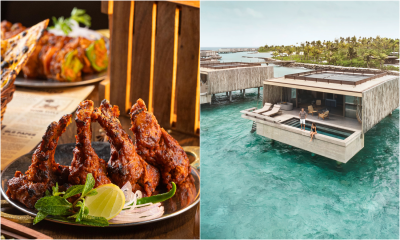
 Cooking1 week ago
Cooking1 week agoPatina Maldives, Khyber unite for Holi festival dining experience
-
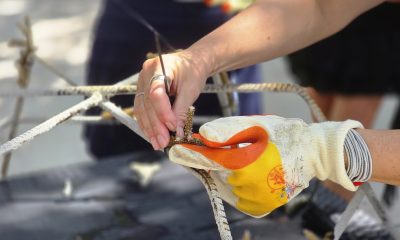
 Action1 week ago
Action1 week agoNoku Maldives strengthens reef protection through coral propagation
-
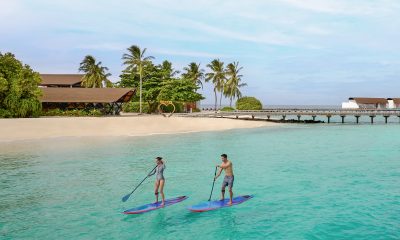
 News1 week ago
News1 week ago‘Endless Summer’ brings wellness and family escapes to Westin Maldives Miriandhoo Resort
-

 News1 week ago
News1 week agoKandooma champions collaboration as cornerstone of sustainability progress
-

 Featured1 week ago
Featured1 week agoSt. Regis Maldives Vommuli Resort curates timeless Valentine’s experiences with IVAR Jewellery
-

 Food3 days ago
Food3 days agoMichelin-starred Italian chef Maurizio Bufi brings Lake Garda flavours to The Ritz-Carlton Maldives, Fari Islands
-
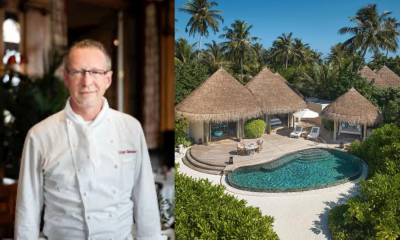
 Drink1 week ago
Drink1 week agoThe Nautilus Maldives hosts Gregor Zimmermann for three-day Easter gastronomic programme
-
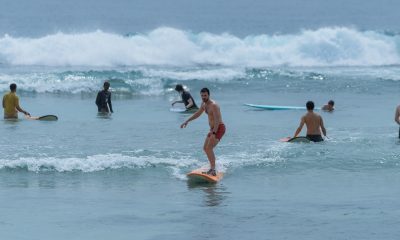
 Action4 days ago
Action4 days agoAtaraxis Grand & Spa hosts integrated work-and-dive corporate retreat in Fuvahmulah











